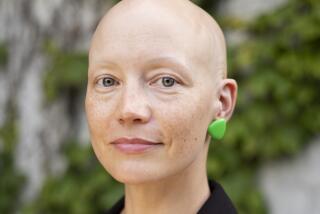‘When people are dying, they are more in tune with their feelings than most people.’
- Share via
Billie Phillips, 26, is a registered nurse at Granada Hills Community Hospital. She took secretarial courses in high school, but her volunteer work as a nurse’s aide influenced her career choice. Her mother and three sisters are also nurses. She is working on a gerontology degree.
I’m working in the symptoms control program. When I first came to work there, I thought, “God, how can these people take care of these patients? They’re all dying, how depressing.” But it wasn’t. I found that when people are dying, they are more in tune with their feelings than most people. I became part of their family when I came on that unit. I’ve been there almost seven years.
We control the symptoms of terminal illness, whether it be pain, nausea, infection or whatever the symptom happens to be. Sometimes it’s not possible, but at least we can comfort them a little bit more than a normal nursing unit could.
You have to be caring and supportive, and I think you have to be really honest. I’m real honest with my patients. A patient asks me, “Am I going to die?” I can’t lie to them and say no, because they know they’re dying or they wouldn’t ask the question. They just want to talk about it. So I tell them yes.
Being honest with them builds a more trusting relationship. I think that helps. It helps a lot. Some nurses would rather avoid it and change the subject. I let them talk it out, let them know there is someone who is willing to listen and not brush them off.
My favorite time is being able to sit with patients and talk with them and hear what they did in their lifetime. They were a waitress, or they were a ditch digger. I like that. I think I learn most from listening. I learn their wisdom.
I grew up with five kids in my family, and I happened to be the third one in line. My mom said, “Billie, you didn’t talk until you were about 3 years old. You just listened.” I think I was born a good listener. And I was a peacemaker. I do that in my job a lot. If a patient doesn’t get along with her nurse, I’d be the one to go in there and make peace.
I don’t consider myself tough. Sometimes when I see a patient suffering and there’s nothing I can do, I feel so frustrated. I’ll walk off the unit for five minutes and cry, and then I’ll come back.
I remember one patient. She would get well enough to go home, and then she’d come back after a month or two, so we knew her off and on for a year. When she came back for the last time, I knew it was her last time. We were talking, and she didn’t look good. I said, “You know, Jeannie, I think you’re not going home this time.” She said, “You know, Billie, I think you’re right.” I looked at her and she looked at me and she grabbed my hand and started to cry. I started to cry. I couldn’t help it. We both cried together and gave each other a hug.
I said, “You know, I’m going to be off for the next couple of days, and I don’t think you’re going to be here when I come back, and I’d like to say goodby.” We hugged again and she said, “Goodby, Billie. It’s been a pleasure knowing you.” She died four hours later in the middle of the night.
When someone dies, the nurses around you are supportive. It helps because we can talk it out and work it through.
You have your favorites. A woman in her 40s came to us with cancer. She was having an extreme amount of pain. By the time she was feeling better, I’d walk in the room and she’d say, “There’s my angel, you’re always such a comfort when you walk in my room. I know that you are going to help me when my disease progresses.” She stayed with us until she died.
It was such a joy to see her and to know that, when she did die, she would have as much comfort as possible. This was almost six years ago that I took care of her, and I’m still friends with her son. It was real hard on him. Even now when he calls, he says, “I was thinking of my mom last week. That’s why I’m calling. I wanted to talk to you and see how you’re doing.”
There are a lot of rewards in our job. What we give out we get back tenfold, because they are so grateful.
More to Read
Sign up for Essential California
The most important California stories and recommendations in your inbox every morning.
You may occasionally receive promotional content from the Los Angeles Times.










